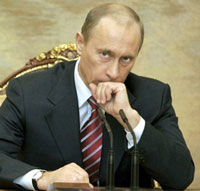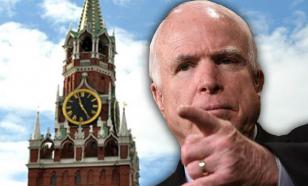Russia speaks forcefully of arms control showing the West its place
President Vladimir Putin's announcement over the weekend that Russia will suspend participation in a major European arms control treaty finally got the West's attention.

The Kremlin said the decision was forced by security concerns, but it was seen as less about fears of military confrontation and more about a resurgent Russia's desire to show the West that its interests cannot be ignored.
For years, the Kremlin has voiced its frustration that no NATO members have ratified the updated treaty, which limits the number of tanks, aircraft and other conventional weapons in Europe. After Putin threatened in April to suspend Russia's participation, a meeting was held in Vienna, Austria in June, but no progress was made on breaking the impasse.
Russia can no longer tolerate a situation where it is complying with the treaty, but its partners are not, Kremlin spokesman Dmitry Peskov told The Associated Press after Putin made the announcement Saturday. Peskov expressed the hope that Russia's move will push Western nations to ratify the treaty.
"Until we start to speak forcefully, no one wants to listen," Fyodor Lukyanov, editor of the Russia in Global Affairs journal, said Sunday. "When we speak quietly, no one is willing to meet us half way."
Under Putin, Russia has been reasserting itself as a global power and challenging what it sees as U.S. domination. Washington's plans to build a missile shield in Central Europe have angered Russia, which is bitter over NATO's expansion into the former Soviet bloc.
But Russia's suspension of its participation in the treaty does not reflect any intention for a major buildup of heavy weaponry in European Russia, military experts said. It has neither the need nor the resources, they said.
The Conventional Forces in Europe treaty was signed by Russia and NATO members in 1990, when Soviet and NATO troops faced off in Central Europe. It placed limitations on military hardware and restricted the forces that could be deployed along borders.
In 1999, Russia and NATO members agreed to amend the treaty to reflect changes after the Soviet Union's breakup, and Russia pledged to withdraw its forces from the former Soviet republics of Georgia and Moldova.
Russia ratified the updated treaty in 2004, but the United States and other NATO members have refused to do so until the withdrawal is complete. Russia has been making slow progress on pulling out its troops.
NATO's position has not changed, alliance spokesman James Appathurai said Sunday. He could not confirm a New York Times report that NATO plans to convene a task force of member countries Monday to formulate a response to Putin's announcement, but he said it was possible that ambassadors woulddiscuss it duringa meeting early in the week.
A spokesman for the U.S. National Security Council said Saturday that discussions will be held with Russia on the best way to proceed.
Mikhail Gorbachev, who was the Soviet Union's president when the original treaty was signed, said Sunday that the conventional arms agreement remains important for maintaining stability in Europe, but it is "absolutely illogical" for Russia to abide by the treaty if NATO members refuse to ratify it.
"What actually matters now is that we want to save this treaty and keep the principle of equality," the Interfax news agency quoted Gorbachev as saying. "The president's decision is a strongly-worded, insistent proposal intended for a constructive dialogue and for implementing the treaty."
The decree signed Saturday by Putin on freezing participation in the treaty cited "extraordinary circumstances ... that affect the security of the Russian Federation and require immediate measures," the Kremlin said in a statement.
The suspension takes effect in 150 days, according to the decree.
In a statement accompanying the decree, the Kremlin listed six reasons for suspending the treaty. Most relate to the expansion of NATO into the Eastern Europe and the Baltic states, which the statement suggests has made the 1999 treaty obsolete.
Alexander Golts, a respected military analyst, said there was no military logic to Putin's decision, which he said was aimed at sending a political message to the West.
"The Kremlin prefers to verbalize its displeasure with the West in military terms," Golts said Sunday.
He said the Kremlin wants NATO to revisit the treaty, but has no illusions that its demands could be met. What is important for the Kremlin is that negotiations are held and drag on indefinitely, Golts said.
Lukyanov said he expects the Kremlin to seek a reconsideration of all treaties and agreements reached during and after the Soviet breakup, when Moscow was weak. The United States, he said, had set the example by pulling out of international agreements that no longer served its interests.
Sergei Karaganov, chairman of the Council on Foreign and Defense Policy, which advises the Kremlin, also said NATO members were unlikely to agree to ratify the treaty or to reopen its terms for discussion.
"I think the treaty will remain on the scrap heap of history, which is what it deserves," Karaganov said, according to state-owned news agency RIA-Novosti.
By announcing the suspension of its participation, Russia makes clear that it will no longer play by the rules that were drawn up when the Soviet Union was crumbling and Russia was weak, he said.
Subscribe to Pravda.Ru Telegram channel, Facebook, RSS!




